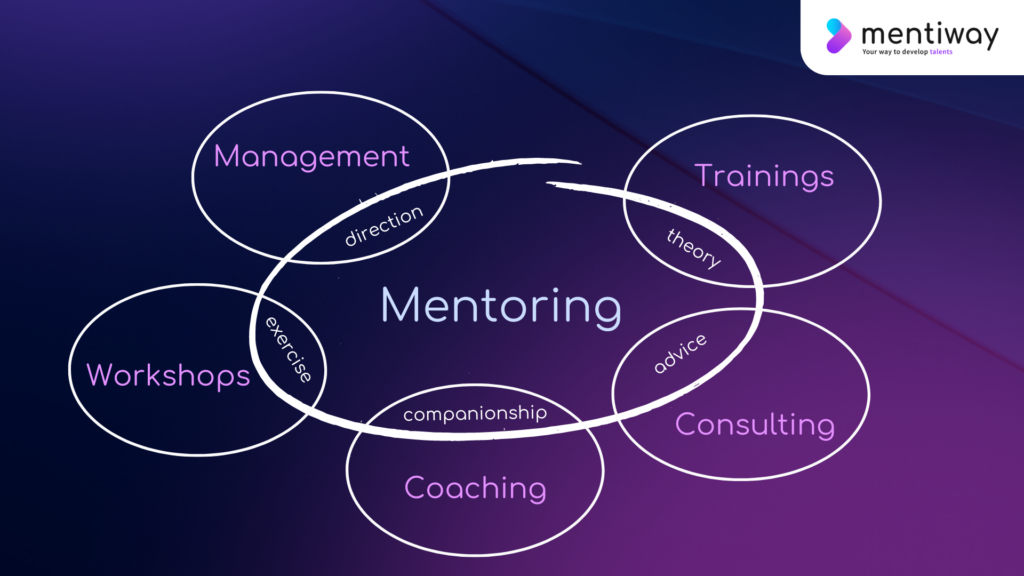Methods of developing the competences of company employees
You probably don’t need to convince anyone to take care of developing the competence of your company’s employees. More competent employees mean increased efficiency and quality of work, better motivation, innovation, less rotation. As Mentiway, we provide a platform to realize one form of competence development – mentoring, but there are definitely more of these methods. In this article I will present a list of the most popular methods. Some of them are fairly obvious, but I hope you will nevertheless find new inspiration for developing your own team in this article.
At the outset, I would also like to point out that, as Mentiway, we are best known for mentoring and it is on this form of employee development that we usually write on our blog. But on the other hand, as the founders of the Mentiway platform, we also have years of experience in the topic of team management, and we have used many methods of staff development – whether individually or to develop our employees.
We have also written about comparing mentoring to coaching and other forms of development in earlier articles, which I invite you to read:
- Mentoring versus coaching and other forms of talent development – a comparison
- What is mentoring – definition and practical significance
Why increase employee competence at all?
The topic is seemingly obvious, but when we start thinking about the reasons and benefits of competence development, it turns out that there are many more than just “simple” improvements in work efficiency.
I counted at least 8 of these benefits:
- greater work efficiency
- And its higher quality,
- Improving job satisfaction and employee motivation,
- Adaptation of work to the changing environment (new trends, technologies),
- Reduce employee turnover and
- the need to employ people in areas that have not been developed so far,
- Increase in innovation, creativity,
- Improving the quality of company management (in the case of competence development for managers).
Probably in addition to these benefits, each organization is also able to find others based on the individual circumstances of the company or industry.
Competence and talent development methods
As you can see, there are many reasons to take care of employee development, the question now is what methods we have to choose from:
- Internal and external mentoring
- Online and onsite training
- Courses under certification
- Workshops and teamwork
- Conferences and events
- Advice, consultation
- External coaching
- Internal master mind groups
- Diversifying the scope of work
- Conscious team management
Internal and external mentoring
I put this method first because of our experience – it is simply a form of employee development that we as Mentiway deal with on a daily basis.
Mentoring can take the form of in-house programs in which both Mentors – people with more experience – and Mentees – people who learn under Mentors’ guidance – are from the same company. This form works best in companies with at least 100 employees, so that mentoring processes are carried out between people from different departments, different competency silos.
Mentoring can also be implemented in the form of external programs – organized by universities or various foundations. Then both Mentors and Mentees have the opportunity to work with people outside the company.
Mentoring combines the benefits of many different forms of talent development:

- It has a individual approach to those being “trained”.
- Improves self-assessment, insight into one’s own capabilities and aspirations.
- Provides an opportunity for practical application of knowledge between sessions (so-called homework).
- In addition to development, it also allows for ongoing discussion and problem solving.
- Thanks to the long timeframe (6-12 months), it allows flexible approach and adaptation of scope and objectives to changing requirements during.
More about mentoring in the company you will read in this material.
Online and onsite training
Training is one of the more obvious methods of talent development. They certainly come to mind first.
However, I believe that their effectiveness in developing competencies sometimes varies and is very often overestimated due to the potential low engagement of participants. Of course, it all depends on the topic, the organization and the trainers themselves, but I know from my own experience that without some kind of follow-up system, what was in the training is very quickly forgotten.
One variation of training is online courses, including those provided on platforms such as Udemy or Coursera. I myself have benefited from several such courses, and in my opinion they make sense, but only if the knowledge gained in this way is immediately put into practice.
Courses under certification
I deliberately separated from the previous “category” courses that are done for a specific certification. An example of such online training, which I myself attended, is a course under the Google Cloud Professional Developer certification.
The advantage of this method is the inclusion, in addition to the knowledge elements, of exercises -tasks to be done independently. In addition, courses of this type often end with an examination, which triggers a natural need to learn, and thus the knowledge has a chance to stay with us for longer.
Workshops and teamwork
Another type of employee development is stationary workshops including teamwork. This is an interesting alternative to training, because firstly it involves participants more and gives the opportunity to practice the acquired knowledge in practice, and secondly it very often fulfills the role of integration in teams. Participants, working together on tasks, get to know each other better and strengthen the bonds between them.
Conferences and events
This, in my opinion, is an often underestimated form of competence development. Its undoubted disadvantage is often the high cost of participation in the conference + the cost of the delegation. But very often, in addition to the opportunity to broaden your perspective and develop in your chosen field, they also provide an opportunity for networking – getting to know people from a similar industry and exchanging experiences. However, definitely on a smaller scale and for a limited group of employees.
Advice and consultation
Maybe this is not a typical form of competence development, but rather a way to find a solution or broaden perspective in specific cases. However, I decided to add this method here too for potential inspiration, because sometimes this form of support takes the form of a training course / workshop, followed only by a consultation phase, very often offered by companies or specialists in a specific hourly range.
External coaching
This method tends to be time-consuming and quite costly, especially on a large scale, but at the same time can be extremely effective. As with mentoring, we are dealing with one-on-one work here, so each process is individual and often also spread out over time.
Well-conducted coaching makes it possible to recognize one’s own capabilities, discover potential, sometimes change attitudes toward work and co-workers. It is based on a large number of questions, self-reflection, the use of various coaching techniques.
Very often coaching is about executives, in which case you can also talk about leadership coaching or executive coaching.
Networking, master mind groups, case studies
This is a slightly less obvious method of developing employee competence, but at the same time I know from my own experience that it can sometimes be extremely effective. It is about any initiative related to involving employees themselves in the development of others. This can be any support groups, discussion groups, or periodic meetings in which selected people share their own knowledge.
In my case, meetings held once a month, during which people willing to present case studies from their own projects, worked nicely. They showed what had been done and what the results were.
In addition to its educational value, such initiatives also have a positive impact on the atmosphere and integration in teams.
Diversify the scope of work and implement your own initiatives
Here, on the one hand, we have a method familiar from corporations: job rotation, in which employees cyclically change positions. But under the category of “diversification of the scope of work” we can include various other initiatives that broaden or slightly change the scope of responsibilities.
This can be, for example, a exchange of projects in companies performing services for companies. A different project, a different client, is always a new experience – a benefit for both the employee and the project, where there is a potential change of perspective and a refreshing of ideas.
We can also include grassroots or top-down supported initiatives in which employees engage in responsibilities beyond the “daily” scope of work. These can be any volunteer work, CSR projects, for the benefit of the team. Each such project is a new experience, and therefore development for those participating.
Conscious team management
Finally, I leave the category related to the active and conscious role of the team leader or those responsible for staff development. By this I mean all activities related to planning and leading development over time, among other things:
- Defining and monitoring development (non-business) objectives,
- cyclical evaluations,
- competency models,
- 360 assessments,
- or even consciously planned one 2 one meetings between a manager and a subordinate.
Summary
I hope you will find inspiration for yourself among the talent development methods listed above. This is, of course, a very cursory treatment of the topic, and if you want to explore a particular method or set of methods more, it will be necessary to expand your knowledge at least by searching on Google.
Organization of the first mentoring program
As Mentiway, our greatest experience is undoubtedly in the area of mentoring. Our platform enables both for companies and for universities or foundations and associations, If you are interested in this form of development, then we invite you to contact us, we will be happy to advise you on how to launch your own mentoring program.
I also invite you to read the mentoring guide and see the mentoring case studies for more information about mentoring.
Hi, my name is Thomas. I am the Co-Founder of Mentiway. We are happy to share our knowledge and support organisations on their way to success! 💪 If you are interested in how to efficiently and effectively implement a mentoring programme in your organisation using technology:








